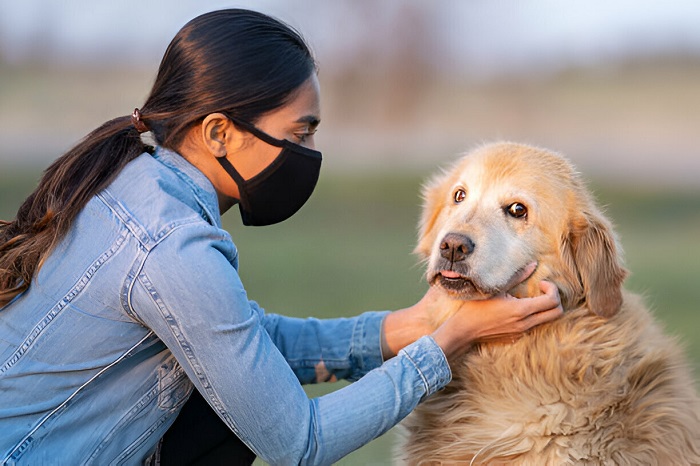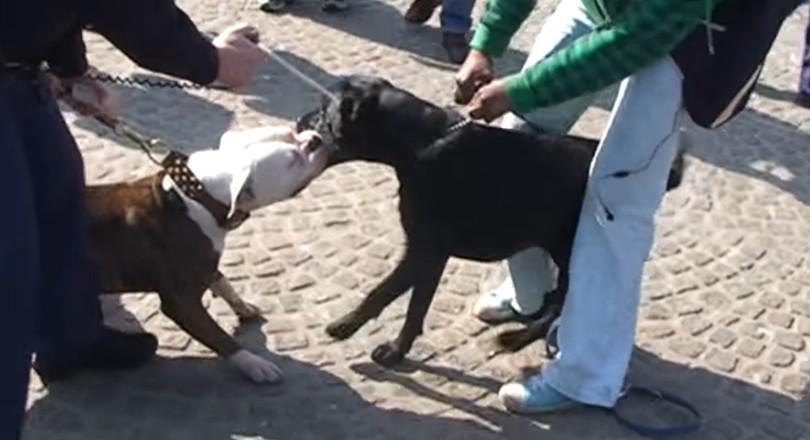Last Updated on February 28, 2025
No, dogs are not immune to tear gas. Tear gas affects dogs similarly to humans, causing irritation and discomfort.
Tear gas, a chemical weapon used for crowd control, affects both humans and animals. Dogs, with their sensitive noses and eyes, experience severe irritation when exposed. Symptoms include coughing, sneezing, eye irritation, and difficulty breathing. Pet owners should keep their dogs away from areas where tear gas is deployed.
Quick action is crucial to ensure the well-being of pets. Rinse their eyes and skin with water and seek veterinary care immediately. Understanding how tear gas affects dogs is essential for their protection and safety. Always be vigilant in environments where tear gas might be used to avoid exposing your pets to harm.
Tear Gas Effects On Canines

Tear gas is a chemical weapon often used for crowd control. It causes severe irritation to the eyes, skin, and respiratory system. But what about dogs? Are they immune to tear gas? This section explores the effects of tear gas on canines.
Physical Reactions In Dogs
Dogs experience many of the same physical reactions to tear gas as humans. Their eyes may water, and they could have trouble breathing. They might also cough and sneeze.
Dogs have more sensitive noses than humans. This means tear gas can affect them even more. Their sense of smell is crucial, and tear gas can damage it.
Here are some common physical reactions in dogs exposed to tear gas:
- Watery eyes
- Difficulty breathing
- Excessive sneezing
- Coughing and gagging
- Skin irritation
Comparative Sensitivity Between Dogs And Humans
Dogs are more sensitive to tear gas than humans. This is due to their heightened sense of smell. Dogs rely on their noses for many tasks, so tear gas can be more damaging.
Here’s a comparison table of sensitivity between dogs and humans:
| Symptoms | Dogs | Humans |
|---|---|---|
| Watery eyes | Severe | Moderate |
| Difficulty breathing | High | Moderate |
| Sneezing | Frequent | Occasional |
| Skin irritation | High | Moderate |
Dogs are not immune to tear gas. They suffer more due to their strong sense of smell. Protecting them from tear gas exposure is crucial.
Protective Measures For Dogs
Dogs are not immune to tear gas. The chemicals can harm them too. They face similar symptoms as humans. These include eye irritation, coughing, and difficulty breathing. Pet owners need to take steps to protect their furry friends.
Preventive Strategies For Pet Owners
Pet owners should be aware of tear gas risks. Preventive strategies can help protect dogs.
- Keep dogs indoors during protests or riots.
- Close all windows and doors to prevent gas from entering.
- Use air purifiers to filter the air inside.
- Create a safe space with clean air for your dog.
Ensuring your dog’s safety involves preparation. Always stay informed about local events. This helps you avoid areas where tear gas might be used.
Emergency Response For Affected Dogs
If your dog is exposed to tear gas, act quickly. Emergency response steps can save your dog’s life.
- Move your dog to a safe, well-ventilated area.
- Rinse your dog’s eyes with clean water.
- Wash your dog’s fur with mild soap and water.
- Avoid harsh chemicals that can harm your dog further.
- Consult a veterinarian immediately for further care.
Keep a first aid kit for dogs at home. It should include items like saline solution and mild soap.
Knowing these steps can make a big difference. Always stay prepared to protect your beloved pet.
Medical Insights On Canine Exposure
Dogs are not immune to tear gas. They can suffer adverse effects just like humans. Tear gas can cause serious health issues in dogs. This section explores the medical insights on canine exposure to tear gas. It covers treatment options and long-term health implications.
Veterinary Treatment Options
When a dog is exposed to tear gas, immediate care is crucial. Below are some veterinary treatment options:
- Rinse Eyes and Skin: Use clean water to rinse the dog’s eyes and skin.
- Fresh Air: Move the dog to an area with fresh air.
- Oxygen Therapy: In severe cases, oxygen therapy may be needed.
- Medication: Anti-inflammatory drugs can reduce swelling and pain.
Veterinarians may use various methods to treat tear gas exposure. Immediate action helps prevent long-term damage. Always seek professional help for the best care.
Long-term Health Implications For Dogs
Exposure to tear gas can have lasting effects on dogs. The long-term health implications can be severe. Below is a table outlining potential long-term health issues:
| Health Issue | Description |
|---|---|
| Respiratory Problems | Chronic coughing and difficulty breathing. |
| Eye Damage | Persistent irritation or vision loss. |
| Skin Issues | Rashes and prolonged itching. |
| Behavioral Changes | Increased anxiety and stress. |
Long-term health implications may vary. Regular check-ups with a vet ensure early detection of any issues. Proper care and treatment can help mitigate these long-term effects. Always prioritize your dog’s health and well-being.

Frequently Asked Questions
Can You Be Immune To Tear Gas?
No, you cannot be immune to tear gas. Repeated exposure may reduce sensitivity, but it still irritates.
Are K9s Immune To Tear Gas?
K9s are not immune to tear gas. They can experience similar irritation and discomfort as humans. Protective gear is essential.
Are Animals Affected By Tear Gas?
Yes, animals are affected by tear gas. They can experience irritation, breathing difficulties, and other health issues. Keep pets away from tear gas exposure for their safety.
Are Horses Immune To Tear Gas?
No, horses are not immune to tear gas. Tear gas can irritate their eyes, respiratory system, and skin. Always protect horses in areas where tear gas might be used.
Are Dogs Affected By Tear Gas?
Yes, dogs are affected by tear gas. It can cause irritation, respiratory distress, and discomfort.
Conclusion
Understanding dogs’ vulnerability to tear gas is crucial for their safety. Dogs are not immune and can suffer severe effects. Always prioritize their well-being in environments where tear gas might be used. Being informed helps protect our loyal companions from potential harm.
Stay aware and keep your furry friends safe.

